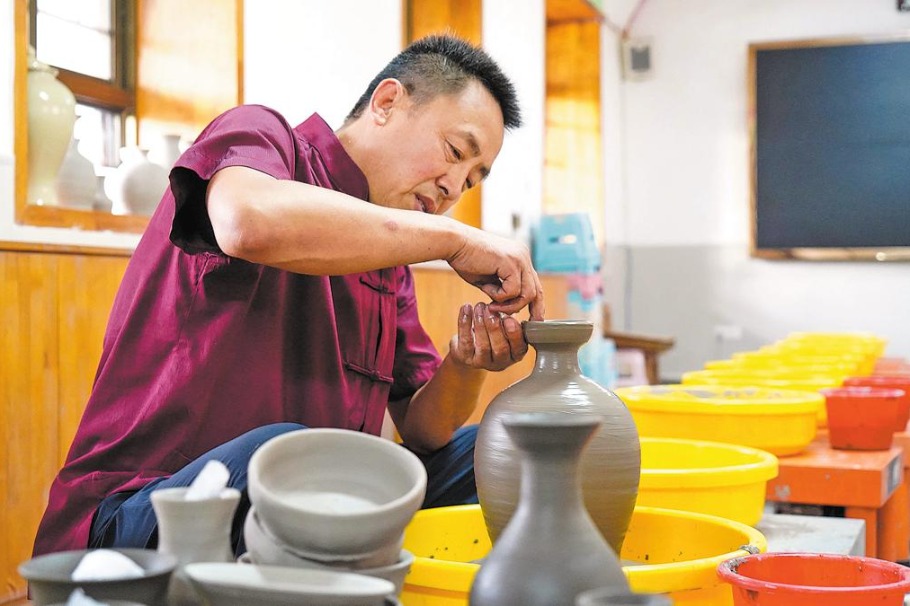Home appliances at heart of policy


Nation hopes boosting consumption of items can create jobs, further its dual carbon goals
As China prepares to issue a guideline to bolster the consumption of green and smart home appliances, analysts and government officials said it will motivate both domestic and global manufacturers to further innovate, create jobs and facilitate the country's efforts to reach its dual carbon goals.
The guideline-jointly proposed by the Ministry of Commerce, the Ministry of Industry and Information Technology, the State Administration for Market Regulation and other government departments-has been approved by the State Council, China's cabinet, and will be released in the near future, according to the Ministry of Commerce.
The government announced that it will push for the recycling and reuse of aging home appliances, underpin the construction of home appliance recycling networks and distribution facilities, and improve delivery, installation and maintenance service standards.
The consumption of home appliances is a key driver of the nation's efforts to boost growth and promote spending, said Sheng Qiuping, vice-minister of commerce.
Affected by the COVID-19 epidemic, especially in the second quarter, the sales revenue of China's home appliances sector amounted to 338.9 billion yuan ($50.23 billion) in the first half of this year, dropping 9.3 percent year-on-year, statistics from All View Cloud, a market consultancy in Beijing, showed.
Eager to restore the industry's earning strength, some provinces have already accelerated efforts to distribute consumption vouchers and offer subsidies to residents purchasing green and smart home appliances as part of government policy measures to stabilize the economy while mitigating the impact of COVID-19.
For example, East China's Shandong province issued coupons worth 200 million yuan between January and June that can be used to purchase products such as refrigerators and air conditioners.
Similar to auto and shipbuilding industries, the home appliance business involves a large variety of manufactured components-including wires, sensors, integrated circuits, plastics, motors and electronics-and has a long industry chain, said Zhang Yongjun, a researcher at the China Center for International Economic Exchanges in Beijing.
Many domestic players-including Midea Group, Gree Electric Appliances Inc and TCL Technology Group, all in Guangdong province-have already sped up their research into core technologies and key materials to better compete with established companies in Japan, South Korea, Germany and the United States in recent years.
Encouraged by new policy measures and lucrative market potential, both domestic and global companies are expected to deploy more resources to adopt new-generation information technologies such as big data, cloud computing and artificial intelligence to create new types of green and smart home appliances throughout China, Zhang said.
"Products with lower energy consumption will also help China achieve its dual carbon goals-peaking carbon emissions before 2030 and achieving carbon neutrality before 2060," he added.
Supported by 4.8 million people in the industry chain across China, the home appliance industry saw sales revenue amount to 1.74 trillion yuan last year and exported over $100 billion worth of products to more than 160 countries and regions, data from the Ministry of Industry and Information Technology showed.
Apart from producing 41.62 million refrigerators, 122 million air conditioners, 41.13 million washing machines and 89.86 million televisions from January to June, China's exports in this category reached $44.12 billion during that period.
Empowered by digital and telecommunication technologies, smart televisions, refrigerators and washing machines are gaining popularity among Chinese consumers, said Zhao Ying, a researcher at the Institute of Industrial Economics of the Chinese Academy of Social Sciences in Beijing.
"The replacement of outdated home appliances with new ones will boost sales for home appliance makers and create momentum for related industries, such as the recycling, dismantling and reuse of home appliances," he said, adding that the promotion of green and smart home appliances is also in line with the country's goal of pursuing the path of green, low-carbon and sustainable growth.
During a meeting of the Political Bureau of the Communist Party of China Central Committee last month, policymakers stressed that macro policies should play an active role in boosting consumption, and fiscal and monetary policies should effectively make up for the lack of social demand.
The Ministry of Commerce said that measures will be taken to promote sales of green and smart home appliances in rural areas, and businesses will be encouraged to develop products that cater to the rural market and meet the demands of seniors.
To facilitate these moves, the government will push the development of infrastructure such as 5G services networks and gigabit fiber-optic networks, providing a solid foundation for the use of smart home appliances, said He Yaqiong, director-general of the department of industry of consumer products at the MIIT.
Liu Decheng, director-general of the Ministry of Commerce's department of circulation development, said efforts will also be made to improve post-sales services and recycling facilities for home appliances, and to create a reliable consumption environment.
Concrete actions are needed to build an industry chain covering the recycling, dismantling and reuse of waste resources, to regulate recycling channels and to establish standards that shore up the use of recycled materials, said Ren Xingzhou, former director-general of the Institute for Market Economy at the Development Research Center of the State Council.
For instance, Haier Group, a home appliance maker in Qingdao, Shandong, offered subsidies totaling 80 million yuan to consumers trading in old home appliances for new ones in the first four months of this year, in an attempt to bolster domestic demand and unleash consumption potential.
Wang Lingjun, deputy minister of the General Administration of Customs, said that with tariff cuts created by the Regional Comprehensive Economic Partnership agreement, which took effect in January, and manufacturers' willingness to upgrade the technology of their products, businesses in China, including multinational companies, will be in an advantageous position to further expand their market presence in the Asia-Pacific region.
"Supported by China's supportive policies and rich resources, we can better meet the needs of local consumers and export our innovative products to the world, including the RCEP economies," said Vivian Tu, marketing leader of Philips Domestic Appliances Greater China.
"We will continue to create meaningful products that will expand our global manufacturing network by driving the growth of smart and green manufacturing in China," she said, adding the company, headquartered in Amsterdam, will expand its research team in Suzhou, Jiangsu province, to focus on advanced technologies such as robotics, the internet of things and artificial intelligence over the next five years.
- China advances urban-rural integration
- Jiangsu government investigates Nanjing Museum's handling of donated relics
- China launches Long March 12A carrier rocket
- Kuaishou reports cyberattack as explicit content flood livestreams
- Govt departments work with NPC deputies to promote whole-process people's democracy
- New legal aid volunteer program boosts grassroots services





































